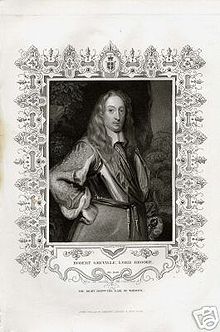Robert Greville, 2nd Baron Brooke
Robert Greville, 2nd Baron Brooke (* May 1607 , † March 2, 1643 in Lichfield ) was a general in the English Civil War on the side of the Republicans.
Life
He was the cousin of Fulke Greville (1554-1628), the first Baron Brooke and owner of Beauchamp Court in Warwickshire , who adopted him at the age of four and took over his upbringing, some of which took place abroad. In 1628 he was elected to the lower house of the English Parliament for Warwick, but did not run because in the same year his adoptive father died childless, and due to a special inheritance regulation, he inherited his property (which also included Warwick Castle ) and his title of Baron Brooke and he took the associated seat in the House of Lords. In 1629 he completed his studies at Cambridge University as a Magister Artium. From 1629 he was a member of a merchant group (Providence Island Company) under the direction of the Earl of Warwick , who wanted to build plantations on the island of Providencia and Tortuga (with participation in the slave trade) and wanted to use them as a starting point for pirate trips against the Spaniards, however wanted to establish puritanical morals. The Spanish destroyed the branch on Providencia in 1635, but this did not slow down the company's entrepreneurial spirit. Greville himself planned in 1638 with the Viscount Saye and Sele to move to the Caribbean, but received no permission from the king.
In 1639 he was supposed to accompany the king as an officer on a campaign to Scotland ( Second Episcopal War ), but refused to follow suit and was briefly imprisoned in 1640. In August 1640 he was one of those who petitioned the king to end the conflict with Scotland bloodless and was appointed one of the emissaries to Scotland.
During the English Civil War he commanded troops in Warwickshire and Staffordshire , where he was Lord Lieutenant in command of the militia. In September 1642 he was appointed Speaker of the House of Lords. In October 1642 he fought in the Battle of Edgehill and was established in January 1643 of the Earl of Essex to Major General appointed. After conquering Stratford upon Avon in 1643 and securing Warwickshire for Parliament, he invaded Staffordshire. He was soon shot dead by a sniper during the siege of Lichfield in front of the cathedral (the bullet hit him in the eye).
He wrote political, philosophical and theological treatises. Studying some of the difficult passages in Revelation and Matthew 24 led to his treatise on the nature of truth. It was sharply criticized by his friend John Wallis .
Around 1630 he married Catherine Russell, daughter of Francis Russell, 4th Earl of Bedford (1593-1641). They had five sons. His successor as Baron Brooke was his son Francis Greville and when he died in 1658 his second son Robert , who in turn was inherited in 1677 by his third son Fulke Greville .
Fonts
- A Discourse opening the nature of that Episcopacie which is exercised in England. 1641.
- The nature of truth. 1641.
literature
- Greville, Robert . In: John Venn , John Archibald Venn (eds.): Alumni Cantabrigienses . A Biographical List of All Known Students, Graduates and Holders of Office at the University of Cambridge, from the Earliest Times to 1900. Part 1: From the earliest times to 1751 , volume 2 : Dabbs-Juxton . Cambridge University Press, Cambridge 1922, pp. 265 ( venn.lib.cam.ac.uk Textarchiv - Internet Archive ).
- James McMullen Rigg: Greville, Robert (1608-1643) . In: Leslie Stephen, Sidney Lee (Eds.): Dictionary of National Biography . Volume 23: Gray - Haighton. , MacMillan & Co, Smith, Elder & Co., New York City / London 1890, pp. 163 - 164 (English).
Web links
- Robert Greville, 2nd Baron Brooke of Beauchamps Court on thepeerage.com
Individual evidence
- ^ Greville, Robert, second Baron Brooke of Beauchamps Court (1607–1643), parliamentarian army officer and religious writer. In: Oxford Dictionary of National Biography . (restricted view: oxforddnb.com ).
| predecessor | Office | successor |
|---|---|---|
| Fulke Greville |
Baron Brooke 1628-1643 |
Francis Greville |
| personal data | |
|---|---|
| SURNAME | Greville, Robert, 2nd Baron Brooke |
| ALTERNATIVE NAMES | Brooke, Robert Greville, 2nd Baron |
| BRIEF DESCRIPTION | English general |
| DATE OF BIRTH | May 1607 |
| DATE OF DEATH | March 2, 1643 |
| Place of death | Lichfield |

